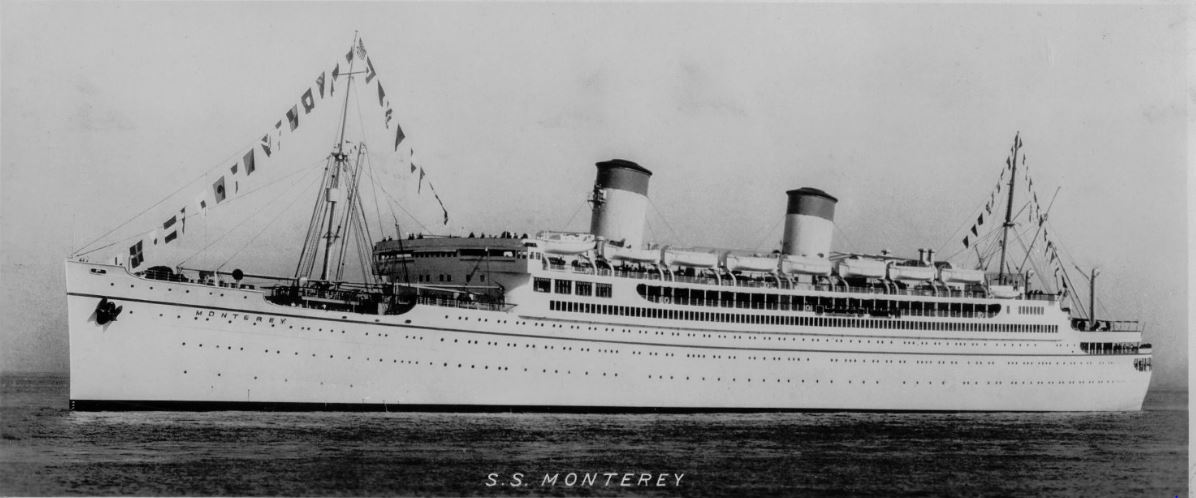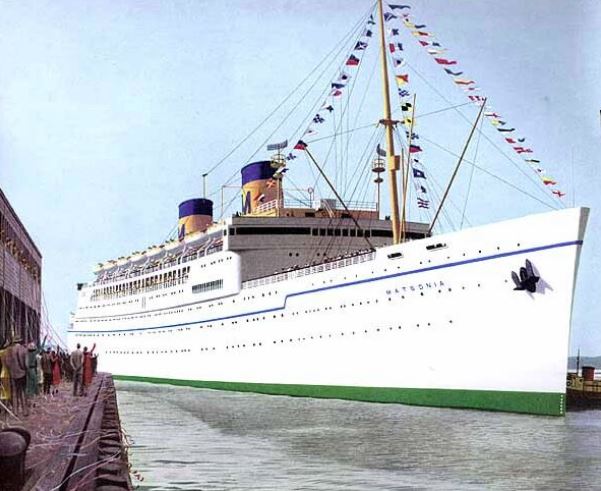Difference between revisions of "USAT Monterey"
From Our Contribution
(→Fremantle to Adelaide 28 - 31 Mar 1942) |
(→Soldiers carried) |
||
| Line 45: | Line 45: | ||
==Soldiers carried== | ==Soldiers carried== | ||
| − | ===Fremantle to Adelaide | + | ===Fremantle to Adelaide 27 Mar - 1 Apr 1942 === |
* [[Norman Gilbert Bryce]] | * [[Norman Gilbert Bryce]] | ||
* [[Norman Stanley Cosh]] | * [[Norman Stanley Cosh]] | ||
| + | * [[William Francis James Elliott]] | ||
* [[David Edward Kitchener Granberg]] | * [[David Edward Kitchener Granberg]] | ||
* † [[Victor Charles Lowe]] | * † [[Victor Charles Lowe]] | ||
Revision as of 17:49, 4 February 2023
Remarks
Monterey was built to promote travel to Hawaii and for Pacific Ocean liner service including regular stops in ports along the West Coast of the United States, Samoa, Fiji, New Zealand and Australia. In World War II Monterey served as a fast troop carrier, often operating alone so she would not be slowed by formation navigation in a convoy. The United States Maritime Commission chartered her in 1941. Requisitioned in February 1942 with transfer of title to the War Shipping Administration on 25 September 1942.
Often referred to as USAT Monterey although she was never Army operated, rather it operated under a bareboat agreement as USAT Monterey. The ship made 13 round trips to Australian ports from the west coast of the US. On 6 November 1943 in an action off Cape Bougaroun, Algeria, 25 aircraft attacked the convoy. Monterey shot down an enemy bomber which passed over the ship and tore away the radio mast before crashing into the ocean.
Following the end of hostilities on 16 February 1946 she departed Sydney with Australian war brides for San Francisco, stopping along the way at Suva, Fiji and Honolulu and Hawaii. Sent to be refitted for civilian use in September 1946, only a small amount of the work required was completed before money ran out, and she sat idle for 5 years until purchased by the US Government who put her in their mothball fleet. In February 1956 she was bought back by the Matson Lines who renamed her SS Matsonia. She returned briefly to passenger service until the early 1960s when she was anchored indefinitely in San Francisco Bay when passenger numbers slumped badly.
However, her sister ship SS Lurline which had continued to sail suffered a major equipment failure in February 1963, and Matsonia was brought back to life, re-christened as SS Lurline and began services again on 6 Dec 1963. By 1970 passenger numbers were again very low and the ship was sold to the Chandris Lines and renamed SS Britania who increased her capacity to 1,655 passengers and after three years on the UK to Australia run, used her as a cruise ship until late 1994.
In November 1994 the Britania was chartered to the US Government to serve at Guantanamo Bay as a floating barracks for military personnel. Following an electrical fire she was repaired by the US Government and again laid up in late 1996. Sold again, this time to a compa0ay that sought to recoup their outlay by selling her to scrappers, her demise was delayed as scrap steel prices had plunged. A year later, while named SS Belofin-1 she was under tow to Indian scrappers when she began to take on water south of Cape Town until she sank on 21 Oct 2000.
Soldiers carried
Fremantle to Adelaide 27 Mar - 1 Apr 1942
- Norman Gilbert Bryce
- Norman Stanley Cosh
- William Francis James Elliott
- David Edward Kitchener Granberg
- † Victor Charles Lowe
- George Charles Owens
- John James (Jack) Trappitt
Notes
The Matson liner, operating as a troopship, is sometimes erroneously seen as USAT Matsonia. A much smaller ship, official number 232021, 5,236 GRT, ex Puerto Rico, ex Hati built by Newport News Shipbuilding, Newport News, Virginia, is also seen in most registers with a 1932 date. This smaller ship was also acquired by WSA on 26 September 1942, allocated to the U.S. Army under bareboat charter and did operate as USAT Monterey.

